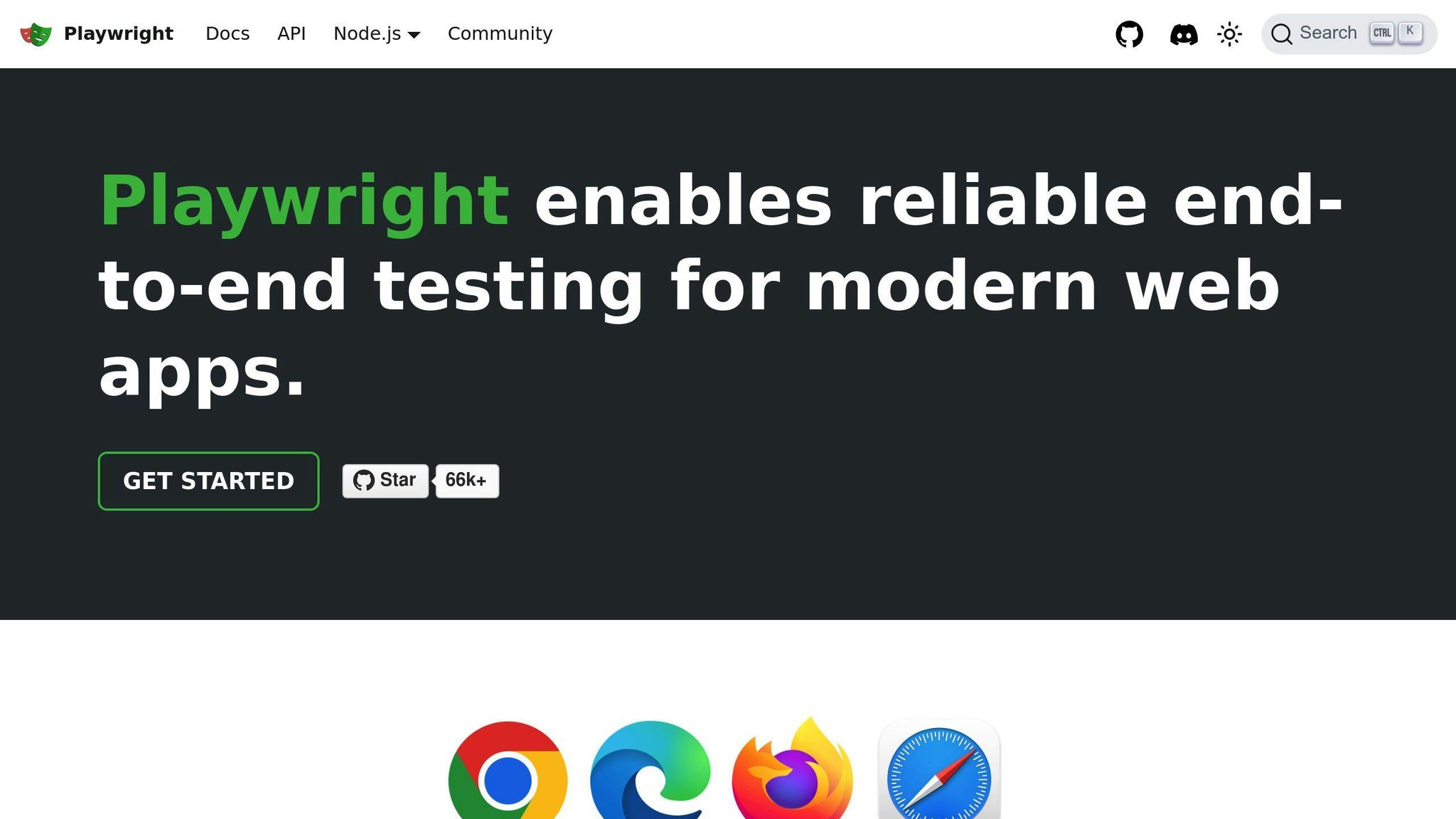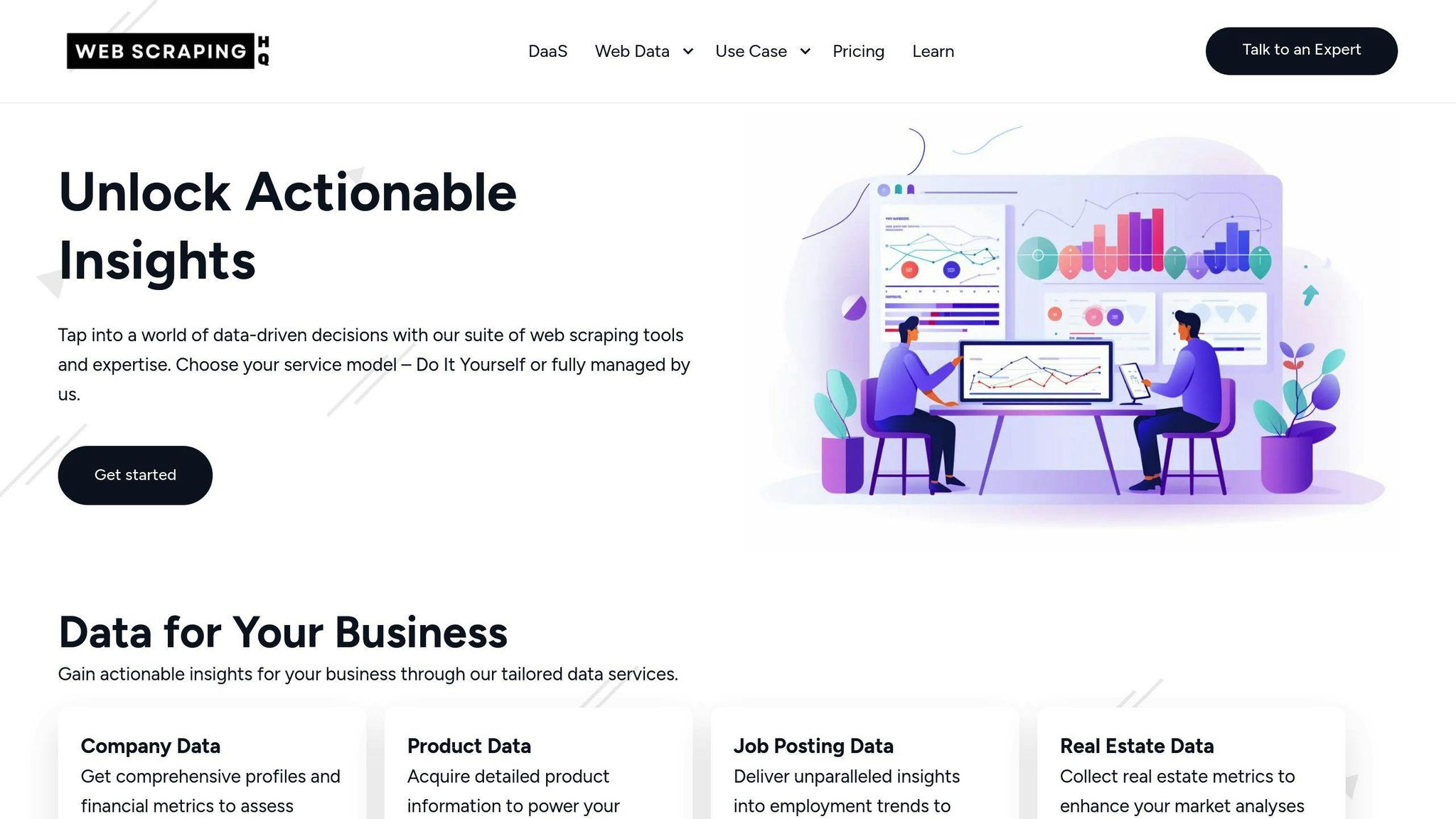
- Harsh Maur
- January 1, 2025
- 7 Mins read
- Scraping
Ultimate Guide to Anti-Bot Measures in Playwright
Web scraping with Playwright is challenging due to advanced anti-bot defenses. Websites use techniques like IP monitoring, browser fingerprinting, and behavior analysis to detect automation, making tools like Playwright easily identifiable without proper configuration. Here's how to tackle these challenges:
- Detection Methods: Websites monitor IPs, analyze browser fingerprints, and detect headless browser behaviors.
-
Solutions:
-
Use stealth plugins like
playwright-extrato mask automation. - Configure user-agent strings and proxies for realistic browsing.
- Integrate CAPTCHA-solving tools like 2captcha.
-
Use stealth plugins like
- Ethical Practices: Always comply with website terms of service and legal regulations like GDPR.
For complex needs, managed web scraping services simplify anti-bot handling with pre-configured tools, ensuring scalability and compliance. Keep reading for detailed setups, examples, and best practices.
How to Avoid Bot Detection by Faking Browser Requests
Understanding Anti-Bot Detection Methods
Websites use various techniques to identify bots, relying on tools like IP monitoring, browser fingerprinting, and headless browser detection to distinguish between human users and automated tools, such as Playwright.
IP Monitoring and Rate Limiting
Websites track IP activity to spot unusual patterns that suggest automation. For example, if requests come in too frequently or sessions last unnaturally long, this can trigger blocks or CAPTCHA challenges.
| Detection Method | Website Response |
|---|---|
| High Request Frequency | Temporary IP block |
| Long, Continuous Sessions | Forced session logout |
| Irregular Timing Patterns | CAPTCHA challenge |
Browser Fingerprinting Techniques
Browser fingerprinting identifies users by analyzing browser settings, operating system details, and how JavaScript behaves. These fingerprints are then checked against known automation patterns to flag tools like Playwright.
Key fingerprinting factors include:
- Browser configuration and version
- Operating system details
- JavaScript execution patterns
- Browser-specific features
How Headless Browsers Are Detected
Headless browsers often leave clues that websites can detect, such as missing APIs, odd rendering behavior, or automated input patterns. These indicators include:
- Modified or incomplete browser APIs
- Irregular JavaScript behavior
- Unusual page rendering styles
- Missing standard browser features
- Patterns of automated inputs
To counter these detection methods, developers often use tools like playwright-extra or puppeteer-extra-plugin-stealth. These tools tweak browser behavior to reduce automation signatures while ensuring compliance with ethical and legal standards.
Grasping these detection strategies is essential for creating methods to avoid them effectively. In the next section, we'll dive into how to configure Playwright to bypass these systems responsibly.
Making Playwright Undetectable

To make Playwright harder to detect, you need to combine several techniques that imitate human browsing behavior while staying within the boundaries of website terms of service.
Setting User-Agent Strings
User-agent strings are essential for making Playwright look like a regular browser. You can customize these strings to match real browser patterns and switch them periodically to avoid detection.
async def configure_browser():
browser = await playwright.chromium.launch()
context = await browser.new_context(
user_agent='Mozilla/5.0 (Windows NT 10.0; Win64; x64) AppleWebKit/537.36 (KHTML, like Gecko) Chrome/120.0.0.0 Safari/537.36'
)
Using Playwright Extra and Proxies
The playwright-extra library extends Playwright's capabilities with stealth features, and when combined with residential proxies, it provides stronger protection against bot detection.
from playwright_extra import stealth
from playwright.async_api import async_playwright
async def setup_stealth_browser():
async with async_playwright() as p:
browser = await p.chromium.launch()
page = await browser.new_page()
await stealth_async(page)
Here are some strategies for using proxies effectively:
| Proxy Feature | Implementation |
|---|---|
| Session Control | Use the same IP for the entire session. |
| Geographic Distribution | Select IPs from the target website's main region. |
| Rotation Timing | Change IPs every 15-30 minutes with random delays. |
Activating Stealth Mode
Stealth mode helps mask bot activity by removing signals that could give away automation. Pair this with randomized delays between actions to mimic real user behavior.
async def human_like_browsing(page):
await stealth_async(page, {
'languages': ['en-US', 'en'],
'platform': 'Win32',
'webDriver': False,
'hardwareConcurrency': 8
})
# Add random delays between actions
await page.goto('https://example.com')
await page.wait_for_timeout(random.randint(2000, 5000))
await page.click('#target-element')
While these methods help reduce detection risks, they should always be used responsibly and in line with site policies. Even with these techniques, CAPTCHAs remain a challenge, which will be addressed in the next section.
sbb-itb-65bdb53
Managing CAPTCHAs in Playwright
CAPTCHA systems are designed to detect and challenge automated behavior. While stealth techniques can help lower detection risks, CAPTCHAs often need specific strategies to handle them effectively.
CAPTCHA Solutions and Integration
There are several tools and services available to tackle CAPTCHA challenges. These include CAPTCHA-solving services, browser extensions, and managed enterprise solutions, each suited to different levels of task complexity. For instance, third-party services like 2captcha can automate CAPTCHA solving by identifying the CAPTCHA element, sending it for processing, and returning the solution.
Here’s an example of how you can integrate 2captcha with Playwright:
from twocaptcha import TwoCaptcha
from playwright.sync_api import sync_playwright
def handle_captcha(page, api_key):
solver = TwoCaptcha(api_key)
captcha_element = page.locator('.captcha-image')
captcha_screenshot = captcha_element.screenshot()
result = solver.solve(captcha_screenshot)
page.fill('#captcha-input', result['code'])
This approach simplifies CAPTCHA handling by outsourcing the solving process, making it easier to manage within your automation workflow.
Ethical and Legal Considerations
Bypassing CAPTCHAs comes with legal and ethical responsibilities. For example, in the United States, the Computer Fraud and Abuse Act (CFAA) governs unauthorized access to computer systems. Any CAPTCHA-related activity must align with these regulations.
To ensure ethical handling, follow these guidelines:
- Respect site rate limits and avoid overwhelming servers.
- Comply with website terms of service.
- Adhere to data protection laws like GDPR.
- Obtain proper authorization before automating CAPTCHA-solving processes.
For larger operations, managed services can simplify CAPTCHA handling. These services take care of the technical and legal complexities, ensuring compliance while providing reliable results. Businesses looking for a hands-off approach can also explore managed web scraping solutions, which include CAPTCHA management as part of their offerings.
Using Managed Web Scraping Services
Playwright is a powerful tool for tackling anti-bot systems, but managed web scraping services offer a streamlined, all-in-one alternative for businesses. These services are particularly useful for developers facing challenges with Playwright's advanced anti-bot handling, as they simplify both technical and legal complexities.
Why Choose Managed Services?
Managed services go beyond what Playwright alone can handle, offering features that address more complex needs:
- Advanced Browser Emulation: Uses sophisticated methods to bypass fingerprint detection.
- All-in-One Solutions: Combines CAPTCHA management and proxy rotation with top-tier infrastructure.
- Built-In Compliance: Ensures legal and policy adherence without extra effort.
| Feature | In-House Solution | Managed Service |
|---|---|---|
| Legal Compliance | Requires dedicated resources | Automatically included |
| Anti-Bot Handling | Custom coding required | Pre-configured tools |
| Scalability | Limited by internal capacity | Scales effortlessly for large projects |
By leveraging managed services, businesses can save time and resources. These services handle complex anti-bot defenses with ready-made tools and advanced proxy strategies, going beyond what a DIY setup typically offers.
Real-World Applications with Webscraping HQ

Web Scraping HQ showcases how managed services excel in overcoming anti-bot defenses across industries:
- E-commerce: Collects product data while bypassing detection systems.
- Real Estate: Scrapes property listings with realistic, human-like behavior.
- Job Market: Automates job posting collection using stealthy techniques.
"Managed services ensure ethical compliance by adhering to strict data handling practices and navigating legal complexities."
Webscraping HQ offers both DIY and fully managed options, with pricing tailored to the complexity of your needs. These services simplify web scraping while ensuring compliance and scalability, making them a smart choice for demanding projects.
Wrapping Things Up
Throughout this guide, we've covered the challenges and strategies for tackling anti-bot measures in Playwright. Successfully navigating these hurdles requires a mix of technical expertise and a strong focus on ethical practices. Modern anti-bot defenses demand more than basic automation; they require a thoughtful approach that combines advanced tools with responsible methodologies.
Here’s a quick look at how the landscape has evolved:
| Focus Area | Current Approach |
|---|---|
| Avoiding Detection | Sophisticated fingerprinting and stealth tools |
| Infrastructure | Scalable, cloud-based systems with compliance |
| Long-Term Success | Ethical methods aligned with legal requirements |
Ethical web scraping plays a central role in achieving long-term success. By respecting website terms of service and prioritizing data quality, developers can avoid issues like IP bans and ensure their operations remain sustainable.
Companies like Web Scraping HQ showcase how enterprise-grade solutions can balance technical efficiency with compliance. Their managed services highlight how complex scraping tasks can be simplified while adhering to ethical standards.
The future of web automation will depend on blending cutting-edge tools - like stealth plugins and CAPTCHA-solving services - with responsible practices. As anti-bot technologies continue to evolve, staying ahead means not just using advanced methods but also committing to ethical and sustainable web scraping practices.
Effective solutions in Playwright go beyond technical fixes - they're about creating responsible systems that can keep pace with the ever-changing world of web automation.
FAQs
Is bypassing CAPTCHA illegal?
The legality of bypassing CAPTCHA depends on the purpose and context. Misusing it can lead to legal violations. Here's a breakdown:
| Context | Legal Status | Key Considerations |
|---|---|---|
| Legitimate Research | Generally legal | Must follow website terms |
| Data Collection | Case-dependent | Requires proper permissions |
| Malicious Access | Illegal | Violates computer access laws |
When using tools like Playwright for web automation, attempting unauthorized access or engaging in malicious activities is against the law. Always ensure your actions comply with website terms of service and data protection laws.
"Respecting terms of service and using managed services are key to responsible CAPTCHA handling."
For enterprise-level applications, services like reCAPTCHA Enterprise provide automation solutions that align with legal and ethical standards. This ensures your automation efforts do not compromise website integrity.
To stay compliant when handling CAPTCHA, focus on:
- Following the website's terms of service
- Obtaining proper authorization
- Keeping detailed compliance records
For specific legal advice, consult professionals or use managed services that automatically address compliance needs.
FAQs
Find answers to commonly asked questions about our Data as a Service solutions, ensuring clarity and understanding of our offerings.
We offer versatile delivery options including FTP, SFTP, AWS S3, Google Cloud Storage, email, Dropbox, and Google Drive. We accommodate data formats such as CSV, JSON, JSONLines, and XML, and are open to custom delivery or format discussions to align with your project needs.
We are equipped to extract a diverse range of data from any website, while strictly adhering to legal and ethical guidelines, including compliance with Terms and Conditions, privacy, and copyright laws. Our expert teams assess legal implications and ensure best practices in web scraping for each project.
Upon receiving your project request, our solution architects promptly engage in a discovery call to comprehend your specific needs, discussing the scope, scale, data transformation, and integrations required. A tailored solution is proposed post a thorough understanding, ensuring optimal results.
Yes, You can use AI to scrape websites. Webscraping HQ’s AI website technology can handle large amounts of data extraction and collection needs. Our AI scraping API allows user to scrape up to 50000 pages one by one.
We offer inclusive support addressing coverage issues, missed deliveries, and minor site modifications, with additional support available for significant changes necessitating comprehensive spider restructuring.
Absolutely, we offer service testing with sample data from previously scraped sources. For new sources, sample data is shared post-purchase, after the commencement of development.
We provide end-to-end solutions for web content extraction, delivering structured and accurate data efficiently. For those preferring a hands-on approach, we offer user-friendly tools for self-service data extraction.
Yes, Web scraping is detectable. One of the best ways to identify web scrapers is by examining their IP address and tracking how it's behaving.
Data extraction is crucial for leveraging the wealth of information on the web, enabling businesses to gain insights, monitor market trends, assess brand health, and maintain a competitive edge. It is invaluable in diverse applications including research, news monitoring, and contract tracking.
In retail and e-commerce, data extraction is instrumental for competitor price monitoring, allowing for automated, accurate, and efficient tracking of product prices across various platforms, aiding in strategic planning and decision-making.